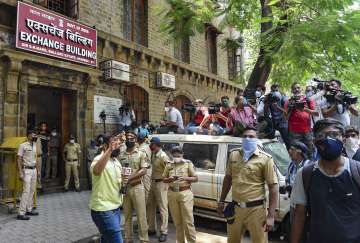Senior advocate Harish Salve and some top lawyers in India have expressed serious concerns on the way the media has been handling cases and running their trial in many cases. "We jump into people's personal lives, we call people names, all in the name of transparency...This system has to be contained if India has to become a serious republic. See the measured response in other countries. See how the BBC covers important cases... In India, no one is willing to have a hard look at the system."," Harish Salve said during the Ram Jethmalani Memorial Lecture. Many top lawyers including Kapil Sibal, AM Singhvi, C Aryama Sundaram, Fali S Nariman, Solicitor General of India Tushar Mehta, Soli Sorabjee and Law minister Ravi Shankar Prasad also attended the online lecture in memory of late Ram Jethmalani.
"Reputations in India don't matter. Privacy is a virtue we scorn," Salve said.
Salve also objected to how there was a "clamour" for the arrest of a person once accused in sensational cases.
"What happened to Justice Krishna Iyer's saying of 'first bail not jail?" Salve asked.
"People say whatever they want to whomever they want about, which then gets picked up on electronic media - anything written on WhatsApp is presumed to be gospel unless proved to be false. Anything heard on TV is again proved to be gospel unless proved to be false... This atmosphere today is not conducive to the Rule of Law, it is the single biggest impediment in India's growth story," Salve was quoted as saying by Bar & Bench.
Without naming the Sushant Singh Rajput death case, Harish Salve said: "It would scare anybody who has practised law, who is familiar with how criminal justice was and who is concerned about how the criminal justice system should be."
However, senior advocate Harish Salve made it clear that he was not in favour of "government-tamed media".
"Only thing worse than reckless media is a Government-tamed media... I don't believe that the Ministry of Information and Broadcasting has any business interfering in content," he was quoted as saying.
Senior Advocate C Aryama Sundaram called the media situation "an institutional failure in India".
"How is the media so involved in the investigative progress? Why? Because people have lost faith in the police. People believe the police is corrupt. The public perception is that the rich can buy himself out..." Aryama Sundaram said.
"Whether we accept it or not, the media has become a public court. It is a fact that the media has started portraying itself as a court of public opinion. It is also a fact that the media has made itself to be a decision-maker of what public opinion ought to be. The media is doing that because the public has lost faith in looking anywhere else," C Aryama Sundaram said.
Fali S Nariman advocates jury system for criminal trials
Fali S Nariman, one of India's constitutional jurist and a senior advocate in Supreme Court, proposed a jury system for criminal trials.
"... perhaps we were too brash in abolishing the jury system. Because it is the jury which represents the people in a criminal trial... We have to seriously think about whether we should have a panel - not a jury perhaps - (but a) a panel who are disinterested and who would give their verdict. Because you can't prevent the public from forming an opinion," Fali S Nariman said.
Nariman, who has authored several books on Indian law and constitution, however, made it clear that media could not be prevented from forming an opinion or taking a position.
"I don't think we are in a position to prevent the media from expressing their opinion either. So we have to have some sort of an intellectual panel which will form a considered and thought-provoking opinion," Nariman concluded.
Asked for the last word, Solicitor General Tushar Mehta said, "Mr Nariman must always have the last word."
Ram Jethmalani's son and senior advocate Mahesh Jethmalani moderated the lecture.
Latest India News
